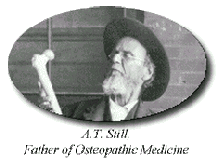Osteopathic Medicine
History, OMT, and Education
Osteopathic Medicine
 There are two types of physicians fully licensed to practice medicine in all 50 states: those holding the MD degree and those who have earned the DO - doctor of osteopathic medicine - degree.
There are two types of physicians fully licensed to practice medicine in all 50 states: those holding the MD degree and those who have earned the DO - doctor of osteopathic medicine - degree.
Both types of physicians are licensed to perform surgery and prescribe medicine in hospitals, clinics, and private practices throughout the U.S. Osteopathic physicians offer all the services M.D.s do -- and more.
Osteopathic medicine was developed in 1874 by an MD named Andrew Taylor Still who was dissatisfied with the effectiveness of 19th-century medicine. Because Dr. Still felt many medications of his day were ineffective and even harmful, he began an in-depth study into the attributes of good health in order to better understand the process of disease.
As a result of his studies, Dr. Still founded a philosophy of medicine focusing on the unity of all body parts. He identified the musculoskeletal system -- the system of bones and muscles that makes up about two-thirds of the body's mass -- as a key element of health. He recognized the body's ability to heal itself and stressed preventive medicine, eating properly, and staying fit.
Dr. Still pioneered the concept of "wellness" more than 100 years ago. Today, osteopathic physicians carry on his tradition, combining modern medical treatments with suggestions about lifestyle and attitude changes that don't just fight illness, but prevent it as well.
Just as Dr. Still brought his new philosophy of medicine to the people of
the Missouri frontier in 1874, today's osteopathic physicians often serve populations in need. Although DOs can specialize in every recognized area of medicine, from neonatology to neurosurgery, more than half of all osteopathic physicians practice in primary care areas, such as pediatrics, general practice, obstetrics/gynecology, and internal medicine. Additionally, many DOs fill a critical need for family doctors by practicing in small towns and rural areas.
OMT
Osteopathic physicians have one tool for healing and preventing illness in patients that other physicians don't -- Osteopathic Manipulative Treatment, or OMT.
DO's believe that all of the body's systems, including the musculoskeletal system, work together and that disturbances in one system may impact function elsewhere in the body. They also believe that the body is inherently capable of healing itself, though it must constantly fight physical, emotional, chemical, and nutritional "stressors" to maintain a state of wellness.
Once an osteopathic physician has ruled out non-mechanical causes for a patient's illness or injury (through blood and urine testing, x-rays, etc.), he or she may use OMT, a hands-on manipulation of the musculoskeletal system. DO's use OMT to diagnose, treat, and even prevent injuries and illness. And, when appropriate, they use OMT in conjunction with (or in place of) medicine or surgery.
Manipulative medicine is commonly associated with lower-back pain, but this far-reaching form of treatment can also relieve the musculoskeletal problems associated with numerous disorders, including asthma, carpal tunnel syndrome, menstrual pain, sinus disorders, and migraines.
Osteopathic Education
Just like allopathic physicians (MD's), osteopathic physicians go through a rigorous schooling and licensing process, and once they are practicing they must continue their medical education.
After acquiring a four-year undergraduate degree with requisite science classes, students are accepted into one of the nation's 21 osteopathic medical schools accredited by the Bureau of Professional Education of the American Osteopathic Association.
The first two years of the osteopathic medical curriculum focus on the basic sciences. The third and fourth years emphasize clinical work, with much of the teaching in community hospitals, major medical centers, and doctors' offices. During the clinical years, students study general medicine and are involved in research. They rotate through urban, suburban, and rural settings, gaining exposure to all areas of medicine.
As a reflection of the osteopathic philosophy, the curriculum emphasizes preventive medicine and holistic patient care. Medical students learn to use osteopathic principles and techniques of treatment (including OMT) throughout the curriculum.
Following graduation, DO's complete an approved 12-month internship. Interns rotate through hospital departments, including internal medicine, family practice, and surgery. They may then choose to complete a residency program in a specialty area, which requires two to six years of additional training.
Students interested in applying to an osteopathic medical school usually earn a bachelor's degree with a major in the sciences, but as long as they meet the minimum course and grade requirements, DO students may major in any discipline. Undergraduate studies should include at least one year each of English, biological sciences, physics, general chemistry, and organic chemistry. Other requirements may include genetics, mathematics, and psychology.
Applicants must take the Medical College Admissions Test (MCAT), and because osteopathic medicine is a people-oriented profession, prospective students must demonstrate a genuine concern for people. Applicants may wish to spend some time with a DO or do volunteer work in a healthcare setting before considering a career as an osteopathic physician.
